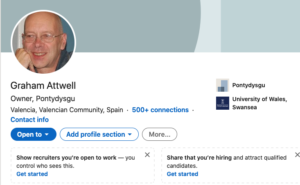
geralt (CC0), Pixabay
There is increasing interest in what labour market information job advertisement portals can provide. OK, most sites will have various skews in terms of what kind of companies advertise on them, but the good side is that they can provide near real time data about labour market supply and demand. In the UK the best known are probably Burning Glass and Emsi. Of course these are both commercial services, charging for their data. LinkedIn also has been collecting and analysing Labour Market jobs adverts and have recently published a list of the UKs fifteen fastest growing job sectors for 2021, including Top jobs, Top skills and Hiring hotspots.
The job sectors are (in rank order):
- E-commerce personel
- Health care supporting staff
- Digital content freelancers
- Construction
- Creative freelancers
- Finance
- Specialised medical professionals
- Professional coaching
- Social, media and digital marketing
- Customer service
- Education
- Mental health professionals
- Real estate
- Specialized engineering
- Artificial intelligence
I’m sure there has been a great deal of work in cleaning and analysing the data. However, I am not quite sure how seriously to take the findings. LinkedIn has presumably a quite heavy skew towards higher qualified professional jobs.
And it is no surprise to find to find the ‘hiring hotspots’ clustered around the major UK cities. In many ways it is teh job titles (or top jobs) that are the most interesting. Job titles are a major problem in trying to clean and analyse data from job adverts. Only recently I had feedback from someone testing a system I am developing that they could not find any jobs for ‘sandwich artists’ on my app.
The top jobs that LinkedIn list for E-Commerce personnel appear neither high paid for requiring high qualification, I am not quite sure what a online specialist is but the rest are driver, supply chain associate, supply chain assistant, warehouse team lead,
And it is pretty obvious why heath workers are in high demand and short supply.
But I am not convinced about high demand for voice over artists and script writers included in the creative freelancers category. Nor am I sure about a shortage of Life coaches (professional coaching), less still ‘growth hackers’ (Social media and digital marketing), whatever that might be.
I wonder if employers are just getting savvy in how to appeal to younger people with job titles not reflecting the real level of pay or indeed skills. But maybe I am too cynical
 LinkedIn is the most boring but probably most useful social network I belong to. I can’ say though I am very interested in spending a lot of time embellishing my professional profile. And I guess its the same for a lot of other people. I guess thats why LinkedIn has developed an algorithm which they offer to write a summary of your profile for you, based they say on “your accomplishments.”
LinkedIn is the most boring but probably most useful social network I belong to. I can’ say though I am very interested in spending a lot of time embellishing my professional profile. And I guess its the same for a lot of other people. I guess thats why LinkedIn has developed an algorithm which they offer to write a summary of your profile for you, based they say on “your accomplishments.”